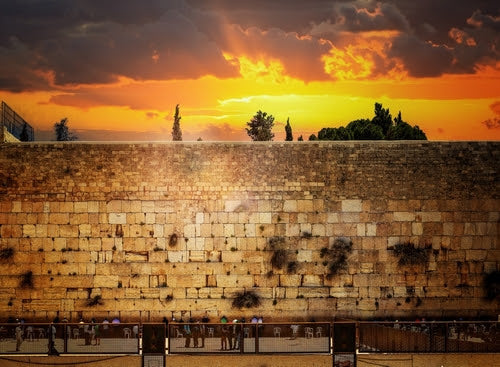FAQ Series in Memory of Ralph and Ruth Gindi
Rabbi Hayim Asher Arking
Rabbi Ezra Ghodsi
Note: The following Halachot apply only to Shivah Asar B’Tammuz and similar fast days, not to Tisha B’av or Yom Kippur.
Why do we fast on Shivah Asar B’Tammuz?
On the 17th of Tammuz five things occurred that we commemorate and mourn with our fasting:
- The first Luhot were broken.
- Before the destruction of the first Bet Hamikdash, the Jews were forced to cease sacrificing the korban tamid (the daily morning and afternoon sacrifice).
- During the time of the second Bet Hamikdash, the wall surrounding Yerushalayim was breached by the armies that would ultimately go on to destroy the Bet Hamikdash.
- Apustomos, a Greek minister, burnt the Torah.
- An idol was placed in the Hechal of the Bet Hamikdash. (According to some this was also done by Apustomus. Others say this was done by King Menashe during the times of the first Bet Hamikdash).
Fasting encourages us to reflect on the sins that brought about these calamities, thus inspiring us to do teshuva. It is customary to give tzedakah on a fast day, as the Gemara (Berachot 6b) teaches that a successful and complete ta’anit is one that leads to teshuva, self-introspection, and good deeds. Some say that one should give money equivalent to the cost of the amount of food that he would have eaten.
Who is required to fast?
Men and women who are above the age of bar/bat mitzvah are required to fast. Women who are pregnant or nursing, or a woman who has given birth within the past 30 days (even if she is not nursing), are exempt from fasting.
I have a headache; can I break my fast?
One who has a headache should continue to fast. If one feels they are unable to continue fasting, a Rabbi should be consulted to decide on a case-by-case basis.
Can I take Tylenol or Advil?
It is permitted to swallow medications without water, provided that it does not have a flavored coating. If one has a strong headache and cannot swallow Tylenol or Advil without water, it is permitted to use a teaspoon of water to aid in swallowing the pill.
How do I know the food I am cooking is seasoned properly?
One is allowed to taste a small amount, (up to a revi’it - approx. 75ml), provided that it is spit out, and none of it is swallowed. When tasting the food, a beracha is not recited. Even on a non-fast day, if one is tasting food solely to see if it is seasoned properly, a beracha is not recited.
Can I chew gum?
Chewing gum on a fast day is not allowed. Although the gum itself is not swallowed, the flavoring and sweetness are.
Can I brush my teeth or use mouthwash?
One who is accustomed to brushing or using mouthwash every morning is allowed to do so, provided that a revi’it (appox. 75ml) of water is not put into the mouth at one time. One should keep their head facing down to ensure that no water is swallowed.
May one use Listerine strips on a fast day?
It would depend on how it is being used. Some view it as an item that does not taste good and is used solely to get rid of bad breath. It would therefore be allowed if left to dissolve completely in the mouth. Others view the strips as a good-tasting item which is prohibited on a fast day, as it would be no different from mint chewing gum.
I accidentally made a beracha, should I eat a little so the beracha is not in vain?
According to many poskim (Hida, Hacham Ovadia, and others), being that reciting a beracha in vain is a uniquely severe prohibition, one should eat a tiny amount, so that the beracha will not be in vain. Afterward, one should continue their fast, and Anienu would still be recited in the Amidah. Others are of the opinion (Kaf Ha’Hayim, Ohr L’Tzion) that one should not even eat a small amount, and should instead recite – “ברוך שם כבוד מלכותו לעולם ועד.”
May one who is not fasting get an Aliyah?
One who is not fasting may not get an Aliyah on a fast day. If the fast is on a Monday or Thursday, he may only get an Aliyah in the morning.
Why do we wear tallit and tefillin by mincha?
One of the reasons why our community adopted the custom to place Tefillin by Minha, is in order to recite two extra berachot. David HaMelech instituted that one should recite one hundred berachot every day. On a regular weekday, one will reach the required amount by praying all the tefillot and reciting berachot before and after eating. However, on a ta’anit, where one only eats at night and not during the day, we put on tallit and tefillin to gain the extra berachot.
What time does the fast end?
The fast ends at Tzet Hakochavim (when three medium-sized stars are visible in the night sky). The exact time is subject to varying opinions and customs, and one should follow the custom of their shul and rabbi.




